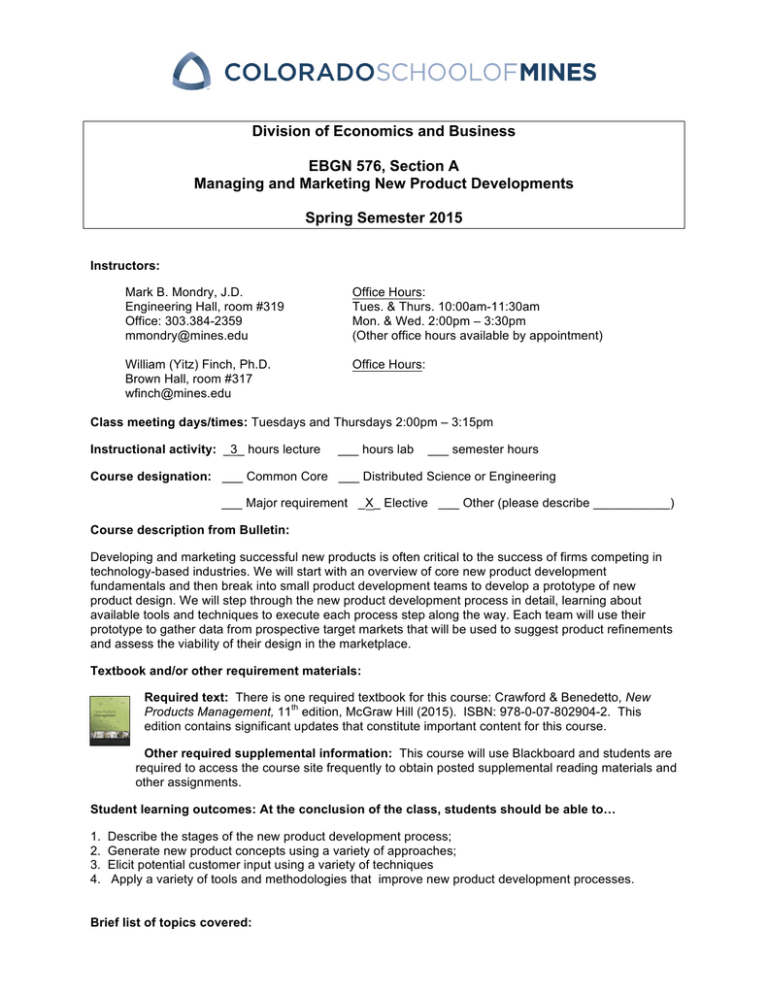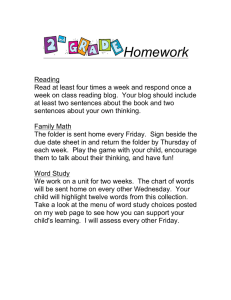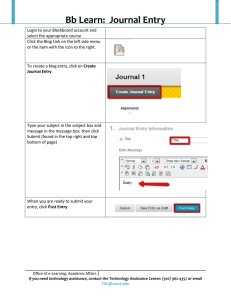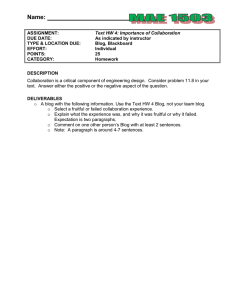Division of Economics and Business EBGN 576, Section A
advertisement

Division of Economics and Business EBGN 576, Section A Managing and Marketing New Product Developments Spring Semester 2015 Instructors: Mark B. Mondry, J.D. Engineering Hall, room #319 Office: 303.384-2359 mmondry@mines.edu Office Hours: Tues. & Thurs. 10:00am-11:30am Mon. & Wed. 2:00pm – 3:30pm (Other office hours available by appointment) William (Yitz) Finch, Ph.D. Brown Hall, room #317 wfinch@mines.edu Office Hours: Class meeting days/times: Tuesdays and Thursdays 2:00pm – 3:15pm Instructional activity: _3_ hours lecture ___ hours lab ___ semester hours Course designation: ___ Common Core ___ Distributed Science or Engineering ___ Major requirement _X_ Elective ___ Other (please describe ___________) Course description from Bulletin: Developing and marketing successful new products is often critical to the success of firms competing in technology-based industries. We will start with an overview of core new product development fundamentals and then break into small product development teams to develop a prototype of new product design. We will step through the new product development process in detail, learning about available tools and techniques to execute each process step along the way. Each team will use their prototype to gather data from prospective target markets that will be used to suggest product refinements and assess the viability of their design in the marketplace. Textbook and/or other requirement materials: Required text: There is one required textbook for this course: Crawford & Benedetto, New th Products Management, 11 edition, McGraw Hill (2015). ISBN: 978-0-07-802904-2. This edition contains significant updates that constitute important content for this course. Other required supplemental information: This course will use Blackboard and students are required to access the course site frequently to obtain posted supplemental reading materials and other assignments. Student learning outcomes: At the conclusion of the class, students should be able to… 1. 2. 3. 4. Describe the stages of the new product development process; Generate new product concepts using a variety of approaches; Elicit potential customer input using a variety of techniques Apply a variety of tools and methodologies that improve new product development processes. Brief list of topics covered: 1. The strategic elements of product development. 2. Opportunity identification and selection. 3. Finding and solving customer’s problems. 4. Analytical attribute approaches. 5. Product concept testing. 6. Sales forecasting and financial analysis. 7. Product Design and use testing. 8. Strategic product launch planning and launch management. 9. Market testing. 10. Prototyping throughout the Product Development Process 11. The relationship between Customer Needs and Engineering Metrics Policy on academic integrity/misconduct: The Colorado School of Mines affirms the principle that all individuals associated with the Mines academic community have a responsibility for establishing, maintaining an fostering an understanding and appreciation for academic integrity. In broad terms, this implies protecting the environment of mutual trust within which scholarly exchange occurs, supporting the ability of the faculty to fairly and effectively evaluate every student’s academic achievements, and giving credence to the university’s educational mission, its scholarly objectives and the substance of the degrees it awards. The protection of academic integrity requires there to be clear and consistent standards, as well as confrontation and sanctions when individuals violate those standards. The Colorado School of Mines desires an environment free of any and all forms of academic misconduct and expects students to act with integrity at all times. Academic misconduct is the intentional act of fraud, in which an individual seeks to claim credit for the work and efforts of another without authorization, or uses unauthorized materials or fabricated information in any academic exercise. Student Academic Misconduct arises when a student violates the principle of academic integrity. Such behavior erodes mutual trust, distorts the fair evaluation of academic achievements, violates the ethical code of behavior upon which education and scholarship rest, and undermines the credibility of the university. Because of the serious institutional and individual ramifications, student misconduct arising from violations of academic integrity is not tolerated at Mines. If a student is found to have engaged in such misconduct sanctions such as change of a grade, loss of institutional privileges, or academic suspension or dismissal may be imposed. The complete policy is online. Grading Procedures. Each student’s final course grade will comprise the following components: 1. Product Development Assignments Bad Design 50 Product Concepts Sketch Model & Short Presentation Customer Interviews (subtotal 20%) 4% 4% 6% 6% 2. Marketing Assignments Analytical Attributes Branding (subtotal 10%) 5% 5% 3. Quizes Quiz I. Quiz II. Quiz III. (subtotal 30%) 10% 10% 10% 4. Team Project (subtotal 30%) Project Description: The most important assignment you will be completing this semester is to develop low-resolution (rapid) prototypes for a new product design and evaluate the commercial potential of your best prototype in a target market. You will work in groups of 3-4 for this assignment and be required to work together outside of our class sessions at time(s) and locations selected by your team. Each group will select an existing consumer products company that the team will “represent” for this project. Typical projects will focus on developing a design for a new tangible consumer product for their company. Each team will create three (3) low- resolution prototypes that will be used to collect preliminary market data and to refine your product concept. Using your finalized design, you will then assess the commercial viability of the design in a market relevant to your selected company. The team project deliverables will include: (a) a written team report (1/3 of team project grade component); (b) a short, in-class business presentation by each team to your student peers (1/3 of team grade); and delivery of your team’s final prototype (1/3 of the team grade). Students will also be required to evaluate the relative contribution of each of their team members. More details about the project deliverables and team project grading will be provided during class in January. Students are encouraged to utilize the resources of the Writing Center (Room 133, Alderson Hall) for the written team report component. The Writing Center can help you and your teams develop and organize your report; correctly cite research and published sources; and/or fine-tune your writing for polish, clarity, adherence to grammatical conventions, etc. To visit the Writing center, go online to http://inside.mines.edu/LAIS-Writing-Center- to make an appointment. 5. Class Participation (subtotal 10%) The exchange of ideas and perspectives between students is an important learning component of this course. Students are required to have read the assigned reading(s) prior to each class session and to prepare for class discussions. You are encouraged to study in groups to prepare for class. Each student is expected to participate in class discussions frequently and add insight and/or ask meaningful questions that advance the discussion. As a guideline, if you are not adding to the class discussion verbally at least once each week (each 2 class sessions), you are not meeting a “B” level for the class participation component of the overall course grade. Note: There is no final for this course. Coursework Return Policy: Assigned coursework that is required to be turned-in (quizzes, assigned deliverables) will normally be returned to students within one week. The team project written report and prototype will be due near the end of the semester and will not be returned. Absence Policy: Generally, students are expected to attend every class session. Your participation in each class benefits all students in the class as we all learn from each other’s contributions, experiences and ideas. It is this sharing of ideas and differing perspectives communicated by class discussions that distinguish the in-class experience from one that could be provided from merely reading the assigned materials. Therefore, excused or unexcused absences will reflect negatively on your in-class discussion/participation grade component. In the event that you anticipate not being able to attend a class session due to illness or a work related or personal obligation, you are expected to contact the instructor in advance by email or phone notifying of your expected absence. In the event of an unanticipated absence (i.e., emergency or unavoidable circumstances), please contact the instructor as soon as reasonably possible to communicate the nature of the absence. Absences that are reasonable (determined at the discretion of the instructor) will be deemed excused, all others will be deemed unexcused. Assignments & Quizzes: • • Assignments must be turned in on or before the time it is due – plan ahead. Late submissions may receive a grade of zero at the discretion of the instructor. Quizzes: If you will be absent during a scheduled quiz, you should schedule a make-up time beforehand. Missed quizzes can be made-up only upon the agreement of the instructor; otherwise a missed quiz will result in a grade of zero for that quiz. Additional Information: Please see Mark Mondry during the first two (2) weeks of class if you have a documented disability and need academic adjustments or special accommodations. All discussions will remain confidential. Detailed Course Schedule: See the attached EBGN 576 Class Schedule and Assignments (subject to change during the semester by notice of an instructor). EBGN 576 – Spring 2015 Class Schedule and Assignments* Tuesdays and Thursdays 2:00pm – 3:15pm Version 1.0 (Dec 28, 2014) *This table is subject to periodic change/revision during the semester with notice by the instructor(s). The current version will always be posted on BB. Abbreviations: BB = Blackboard course site, includes weekly content folder(s); NPM = New Products Management, 11th ed. book): MM = Mark Mondry; YF = Yitz Finch. Assignments: All reading assignments should be completed before the beginning of the class session. “Prepare” means to be ready to discuss in class; “Deliverable” is due at the beginning of class; and “Blog” refers to blog assignment on the BB course site. Week # Week 1 Class # 1 Date: Thursday Jan. 8 Instructor(s): MM & YF Topics: Course Overview and Expectations. Product Development Introduction. The Strategic Elements of Product Development 2 Tuesday Jan. 13 MM 3 Thursday Jan. 15 YF PD Management, a PD process and opportunities, the bad design assignment. 4 Tuesday Jan. 20 MM The New Products Process 5 Thursday Jan. 22 MM Opportunity Identification and Selection: Strategic Planning for New Products 6 Tuesday Jan. 27 MM Creativity and the Product Concept 7 Thursday Jan. 29 YF Finding and Solving Customers’ Problems/Needs (Part I) 8 Tuesday Feb. 3 YF Customer Needs (Part II); Week 2 Week 3 Week 4 Week Assignments Due: None. Read: NPM chap. 1 (pp. 2 – 24). Prepare: Applications questions 1-3 on p. 24 for class discussion. Blog: Post your blog #2 (corresponds to week #2) entry (your intro) on BB by the beginning of class. Read: Blog #2 posts, BB week 2 folder. Blog: Post a comment to another student’s Blog #1 entry Read: NPM chap. 2 (pp. 25-59); BB week 3 folder. Prepare: Applic. questions 1 & 2 (p. 53); LEGO case (p. 53-55); Tastykake case (p. 55-57); Levacor Heart Pump case (p. 57-59). Blog: Post your Blog #3 entry. Read: NPM chap. 3 (pp. 60-87) and Appendix A (pp.543-548); Blog #3 posts. Prepare: Applic. ques. 1-3 (p. 87-88); Honda case (p. 90-93). Blog: Post a comment to another student’s Blog #3 entry Read: NPM chap. 4 (pp.97-123) and Appendix B (pp.549-558); BB week 4 folder. Prepare: Deliverable: Blog: Post your Blog #4 entry. Read: NPM chap. 5 (pp. 130-150); BB week 4 folder; Blog #4 posts. Prepare: Deliverable: Blog: Post a comment to another student’s Blog #4 entry Read: BB week 5 Folder. Prepare: Deliverable: Blog: Post your Blog #5 entry. Class%Schedule%and%Assignments%–%New%Product%Development,%EBGN576% 1% ! 5 9 Thursday Feb 5. YF Prototypes, Sketch Model Assignment 10 Tuesday Feb. 10 YF Functional Modeling (Part I) 11 Thursday Feb. 12 YF Functional Modeling (Part II) 12 Tuesday Feb. 17 YF Sketch Models Presentations (3 min each) 13 Thursday Feb. 19 YF Concept Generation, 50 Concepts Assignment 14 Tuesday Feb. 24 MM Analytical Approaches I: Perceptual Mapping 15 Thursday Feb. 26 MM Analytical Approaches II: Trade-Off Analysis and Qualitative techniques. 16 Tuesday Mar. 3 MM The Concept Evaluation System; Concept Testing 17 Thursday Mar. 5 MM The Full Screen; Sales Forecasting and Financial Analysis Week 6 Week 7 Tuesday Mar. 10 Spring Break Read: BB week 5 folder, Blog #5 posts. Prepare: Deliverable: Blog: Post a comment to another student’s Blog #5 entry Read: BB week 6 folder. Prepare: Deliverable: Blog: Post your Blog #6 entry. Read: BB week 6 folder, Blog #6 posts. Prepare: Deliverable: Blog: Post a comment to another student’s Blog #6 entry Read: BB week 5 Folder. Prepare: Deliverable: Blog: Post your Blog #7 entry. Read: BB week 5 Folder; Blog #7 posts. Prepare: Deliverable: Blog: Post a comment to another student’s Blog #7 entry Read: NPM chap. 6 (pp. 155-168); BB week 8 folder. Prepare: Applic. Ques. 1-3 (pp. 168167). Deliverable: Blog: Post your Blog #8 entry. Read: NPM chap. 7 (pp. 171-187); BB week 8 folder; Blog #8 posts. Prepare: Applic. Ques. 1-3 (p. 187188); Rubbermaid case (p. 188-189) Deliverable: Blog: Post a comment to another student’s Blog #8 entry Read: NPM chaps. 8-9 (pp. 193-239), BB week 9 folder. Prepare: Applic. Ques. 1-3 (p. 210); Chipotle case (p. 210-212); CDC case (pp. 212-213). Deliverable: Blog: Post your Blog #9 entry. Read: NPM chaps. 10-11 (pp. 243283); BB week 9 folder; Blog #9 posts. Prepare: Logitech (A) case (pp. 259261). Deliverable: Blog: Post a comment to another student’s Blog #9 entry No Classes – Enjoy! Thursday Mar. 12 Spring Break No Classes Product Protocol Read: NPM chap. 12 (pp.291-312); BB week 11 folder. Week 8 Week 9 Week 10 18 2! ! Tuesday Mar. 17 MM Week 11 Week 12 19 Thursday Mar. 19 YF & MM Project Teams Formation 20 Tuesday Mar. 24 YF Customer Interviews; The Customer Interview Assignment 21 Thursday Mar. 26 YF Design 22 Tuesday Mar. 31 MM Development Team Management 23 Thursday Apr. 2 YF Product Use Testing 24 Tuesday Apr. 7 MM Strategic Launch Planning; Implementation of the Strategic Plan 25 Thursday Apr. 9 MM Marketing & Branding 26 Tuesday Apr. 14 MM Launch Management 27 Thursday Apr. 16 YF Prototype Lab (fabrication techniques) Week 13 Week 14 Week 15 Prepare: Logitech (B) case (p. 317). Deliverable: Blog: Post your Blog #11 entry. Read: BB week 11 folder; Blog #11 posts. Prepare: Identify/research a company to base the team project around, be ready to pitch it to class (in 1 min). Deliverable: Bring your company pitch outline to class in hardcopy. Blog: Post a comment to another student’s Blog #11 entry Read: BB week 5 Folder. Prepare: Deliverable: Blog: Post your Blog #12 entry. Read: NPM chap 13 (pp.323-343); BB week 12 folder; Blog #12 posts. Prepare: The Mini case (pp.344-345); Gillette Mach 3 and Fusion case (pp. 348-350). Deliverable: Blog: : Post a comment to another student’s Blog #12 entry Read: NPM chap. 14 (pp. 351-376); BB week 13 folder. Prepare: Applic. Ques. 1-3 (p. 376); Provo Craft case (pp. 377-378); Ford Fusion case (pp. 378-380). Deliverable: Blog: Post your Blog #13 entry. Read: NPM chap. 15 (pp. 381-400); BB week 13 folder; Blog #13 posts. Prepare: Deliverable: Blog: Post a comment to another student’s Blog #13 entry Read: NPD chaps. 16-17 (pp.406458); BB week 14 folder. Prepare: Wii case (p. 437); Iridium case (p. 439); Hulu case (p. 459461). Deliverable: Blog: Post your Blog #14 entry. Read: NPM Appendix C (pp. 559564); BB week 14 folder; Blog #14 posts. Prepare: Deliverable: Blog: : Post a comment to another student’s Blog #14 entry Read: NPM chap. 20 (pp.515-535); BB week 15 folder. Prepare: Clorox Green Works case (pp. 536-539); GM case (pp. 539541) Deliverable: Blog: Post your Blog #15 entry. Read: BB week 15 folder. Prepare: teams will work on their prototypes in class. Class%Schedule%and%Assignments%–%New%Product%Development,%EBGN576% 3% ! 28 Tuesday Apr. 21 TBD 29 Thursday Apr. 23 TBD 30 Tuesday Apr. 28 MM & YF Project Presentations – Group 1 31 Thursday Apr. 30 MM & YF Project Presentations – Group 2 Week 16 Week 17 Finals Week 4! ! MAY 2-7 THERE IS NO FINAL FOR THIS CLASS Deliverable: Blog: Post a comment to another student’s Blog #15 entry Read: BB week 16 folder. Prepare: Deliverable: Blog: Post your Blog #16 entry. Read: BB week 16 folder; Blog #16 posts. Prepare: Deliverable: Blog: Post a comment to another student’s Blog #16 entry Deliverable: Teams presenting must submit a copy of their presentation and prototype. Deliverable: Teams presenting must submit a copy of their presentation and prototype. YOU ARE DONE!


